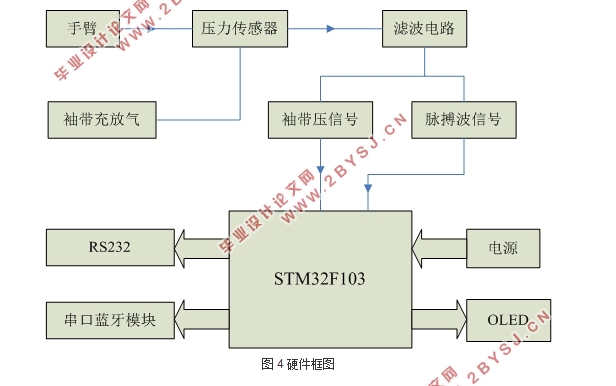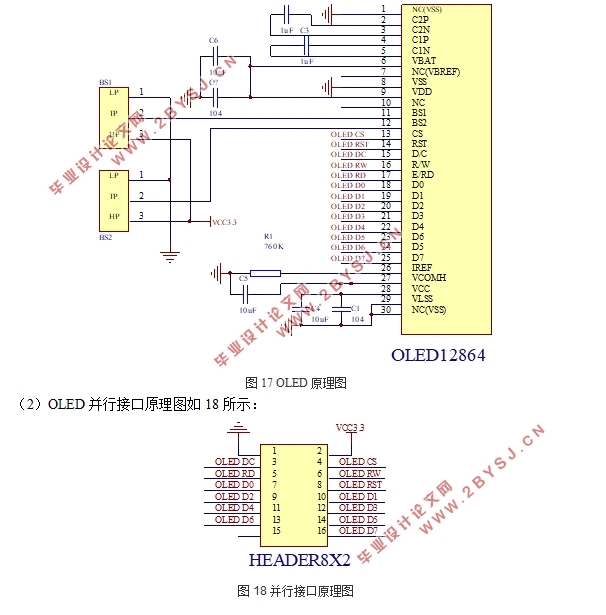基于STM32的电子血压计设计
无需注册登录,支付后按照提示操作即可获取该资料.
基于STM32的电子血压计设计(论文15000字)
摘要:本论文讨论了电子血压计的设计。从测量原理,硬件设计,软件设计,实物检测四个方面详细描述了电子血压计的设计。该款血压计,基于示波法,以STM32单片机为主控,通过压力传感器采集血压信号,利用低通,带通滤波器,分别获取袖带压和脉搏波信号,并对带通滤波器获得的脉搏波信号进行放大。之后利用STM32片内ADC对模拟信号进行A/D转换,并对转换结果进行软件滤波以获取质量更好的脉搏波以及袖带压信号。然后对数据进行同步处理,计算出人体的收缩压,舒张压和平均压。最后将数据显示在OLED屏幕上并利用串口蓝牙模块将血压值传送至手机APP上。之后用这个血压计对三个同学进行测量,通过测量数据分析了这款血压计的精准度以及优缺点。
关键词:示波法;滤波电路;A/D转换;OLED;蓝牙模块
Electronic sphygmomanometer based on the STM32
Abstract:This paper discusses the design of electronic sphygmomanometer.It is described in four aspects,the measuring principle, hardware, software and physical testing. The sphygmomanometer, based on oscillography method, uses STM32 as the master, using the pressure sensor to collect blood pressure signal, using low pass,band pass filter to get cuff pressure signal and pulse wave signal.And then,the pulse wave signal is amplified. ADC in STM32 chip is used tp complete A/D conversion. In order to get better pulse signal, the result of the transformation and cuff pressure signal go through software filter. Then ,calculate the data to get systolic blood pressure, diastolic pressure and mean pressure. Finally the data is displayed on the OLED screen and shown on phones through bluetooth.Finally,use this sphygmomanometer to meassure the blood pressure of three classmates and get the data.By analising the data,we could understand that whether the sphygmomanometer is up to the standard.
Key words:the oscillometric method;filter;A/D conversion;OLED;bluetooth


目录
1.绪论 1
1.1选题背景 1
1.2血压概念 1
1.3测量方法 2
1.4 电子血压计 2
1.4.1 电子血压计简介 2
1.4.2 电子血压计测量指标 3
2.血压测量方案论证 4
2.1测量原理选择 4
2.2示波法测量血压 4
2.3收缩压和舒张压的判定 5
3.血压测量硬件电路 8
3.1压力传感电路 8
3.2信号处理电路设计 10
3.2.1低通滤波器 11
3.2.2 带通滤波电路 12
3.2.3放大电路 13
3.3 STM32F1系列单片机 14
3.3.1主控方案选择 14
3.3.2原理图以及重点模块介绍 15
3.4 A/D转换器 17
3.4.1硬件选择 17
3.4.2 ADC简介 18
3.5 显示模块 19
3.5.1 方案选择 19
3.5.2 OLED显示模块简介 19
3.6蓝牙串口模块 20
4.电子血压计软件设计 22
4.1软件整体设计 22
4.2 基于库函数的STM32程序开发 23
4.3 ADC配置 23
4.4 软件滤波 24
4.5 数据处理 25
4.6 OLED驱动 26
5.血压计测试 28
5.1 实物展示 28
5.2 测试数据 29
6.总结与展望 30
6.1 总结 30
5.2展望 30
参考文献 31
致谢 32
